David Jones: Interview and Sampling of Poetry
Judih speaks with Spoken Word performance poet, David L. Jones
David is a dynamic spoken word poet whose energy comes across the printed page in the modern-day blues of an urban survivor. I first came across his work online in 2006, at a poetry site on Tribes.net. His unique voice marked him as a unique spoken word artist.
He’s regularly performed at open mics in the U.S., performed with the Little Red Studio theater troupe in Seattle, WA, and has published works including “eros besmirched” and “Dark Storms – Race Gender and Politics“. His most current work can be found on his blog, D. Jones, poet (http://www.djonespoet.com).
Since hearing him and reading his work, I’ve wanted to know more about what inspires him. Let’s begin.
Full Name: David Lee Jones
Birthplace: Wheatcroft, Ky. Registered at Morganfield, Ky.
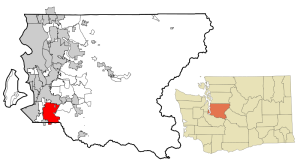
Favourite childhood memory: Canning food with my mother and hunting rabbits with my father.
Questions:
Judih: Could you offer a description of yourself as a poet?
D: Well, the most apt description is in my bio, but to put it in a short form, I attempt to speak the pain of others who may not have the opportunity to speak. I try to articulate what I’m feeling as a common black man in America in these turbulent times. I tend to view my poetry as a chronicle rather than poetry per se.
J: How did you get started?
D: In high school, after the deaths of my parents, I was taken under the wings of 3 bisexual teacher’s aides who saw an opportunity to save a young black male who was not already corrupted by the system. I also had a counselor, Carolyn McCormick, who was integral to my growth as a writer. I think they saw that since I wasn’t from the urban environment, they might have a chance to help me avoid things like crime, gangs and drugs and they used my interest in poetry to do that.
J: Who has inspired you over the years? Artists, poets, musicians, others?
D: Can’t say that I’ve read a lot of other people, but I was drawn to Malcolm X at a young age, Martin as well, but Malcolm more so, and I’m very impressed with Mumia Abu Jamal. His speeches from death row are very inspirational to me. As far as names…lol…well, Chuck D, Tupac, George Clinton, Aretha Franklin, Robert Johnson, Johnny Cash, Merle Haggard, Beethoven, Chopin, Bach, Eminem, Bob Marley, Bob Dylan, Joni Mitchell, Carly Simon, Bukka White, Cab Calloway, Duke Ellington, Metallica, the whole range of music speaks to me. I don’t listen to the music so much as I listen to what the artist is saying. Musicians are, in my opinion, poets who felt the need to augment their words…lol…I’m not so gifted to be able to play an instrument or paint so I have only my words to give. I haven’t seen a lot of art, but I am very impressed with Bosch, Goya and also Jeff Hengst, whom I worked closely with during my time at Little Red Studio. I’m not well versed in the art world but I know what I like when I see it. I do watch a lot of movies though and I guess my favorite would have to be Mandingo directed by Dino De Laurentis. Oh yeah, and Bukowski, can’t forget him.
Judih: I’d like to include one of my favourite poems of yours, “Not Until”, so before we continue, let’s listen to you (click the link below)
J: Do you have a method to your writing that you could share?
D: I have a muse and djinn, they both speak to me. The muse gives me the light stuff, you know, the loving sexy erotic stuff, and the djinn gives me the darkness and articulates the pain. I write a lot at night and when I’m alone. I write when I’m drunk, depressed or horny, you know, the regular sorts of inspirations. I also write when a person’s character strikes me. I think I have a poem about you somewhere, if not, I should write one, you are worthy of poetry you know. I rarely edit because I believe that the poem writes itself, the poet simply channels it onto the page or through the microphone or whatever.
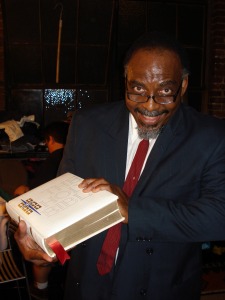
J: Do you listen to music while you work? If so, who or what kind?
D: No, I don’t listen to music when I write; it’s distracting and makes it hard to hear the voices in my head.
J: Do you have a favorite piece that you’ve done? Can you offer it here?
D: Wow, hard question. I consider all my poems as my children and it’s hard to pick a favorite, the others will be upset…lol…, but if I had to pick one, it would be “Liberty Wears A Strap-on”
Liberty Wears a Strap-On
Liberty wears a strap-on
and if you don’t believe,
just ask the Haitians,
Mexicans,
or even the Chinese.
Liberty used to be
such a nice young girl,
holding up her flaming torch
a beacon to light the world.
But nowadays,
it seems that light is gone,
and you can ask any Muslim:
Liberty wears a strap-on.
Give me your tired
huddled masses,
yearning to be free,
and I’ll fuck them all
with no Vaseline.
A strap-on is America’s
tool to invade.
If you don’t think so,
just ask the Guatemalans
resting in their graves.
Liberty wears a strap-on
it’s plain to see.
She surged in the Indians
and came all over slavery.
Justice is a woman
and they say she’s blind,
her friend Liberty
is trying to surge in my behind.
Behind closed doors
where the deals are made,
Liberty and Justice
play for pay.
Liberty and Justice
in the land of the brave–
sounds like a triple X
movie is being made.
Liberty fucks Justice.
Justice loves her too.
Liberty wears a strap-on
and she’s ready to fuck you.
.
About Spoken Word
J: When did you start performing at open mics? Can you offer any tales of amazing performances or interesting audience reactions?
D: I started performing at open mics during high school which was back in the mid 70’s, never went over well. I did a reading with a friend of mine named Jason Ammerman a long while back, well after high school, it was my first nude reading. It was Father’s day and we were reading at a speakeasy underground thing in a house in Bloomington, In. Jason is a kick ass poet and we were all about one upping each other back in those days, both being angry poets. I did a series of erotic poetry and removed a piece of clothing at the beginning of each poem, by the end I was naked and reading the last poem. It got me laid…lol…so I guess it’s good for something. There were many readings that I did at Little Red Studio with an amazing woman, Eileen Fix, that were awesome as well. She and I were instrumental in bringing poetry to the fore there. We made people very aroused with our poetic play. These days, I specialize in “pin drop” moments, you know, where the audience can’t believe that someone would say the things that I say. I like doing that.
J: I like that: “pin drop moments”. What makes a good open mic?
D: A microphone. Seriously though, audience reaction is a big factor, however I’ve read at some open mics where it was only poets reading to each other. I suspect that every performing poet has had their share of doing that. You have to just power through it. My thing is to read the poem the way it felt when it was written, regardless of who hears it. It’s always an open mic when you speak to God, and he is always a good audience.
J: David, have you been filmed during performance? If so, is it something that intrudes on your space?
D: I’ve been filmed once that I know of, it was during a sermon I wrote called “The Book of Cock”. I’ve had people take pictures, but no, it doesn’t intrude on my space at all, though people have told me that I should hold still for the camera, or that something went wrong with the shot. Blame it on my muse and djinn…lol…
Speaking out
J: Your work deals with subjects from the extremely personal to a general call-out to stand up and take notice. How important is it to you to speak out?
D: It’s very important that poets speak out because people need to know that there are those of us whose voices may not be heard and that we have something to say which could benefit society as a whole. I try to keep a balance. “Too much light will blind you, and too much darkness will cause you to lose your way.” It’s also important that people understand that the political is also personal, that political actions have an effect on the personal level and in the society as a whole.
J: Is poetry is a tool for therapy in your own life? If so, could you offer a poem that helped cleanse an especially raw node within you?
D: Yes, poetry is my primary therapy. It’s better that I say things than do things. It gives me a chance to get stuff out and because it’s seen as art, I don’t end up in a mental ward as some raving lunatic. A poem that has helped me a lot is “Fear of a Black Planet” which helped me understand why white women were so scared of me.
Fear of a Black Planet
Yea, I have looked
upon thy face
with mine own eyes
observing thus
a fear by which
reason hath
fled thy being
Thine eyes have
witnessed askance
the black moor
and verily fear
hath caused consternation
to sit astride
thy countenance
Thy breast
being lily white
trembles at the thought
of Moorish hands
weighing the balance
of thy female fruits
For this reason
thy face turns from mine
and the dove wings
of thy hands
soil not themselves
upon the muddy terrain
of my skin
Ere the seed
of my niggardly loins
should chance light
upon the threshold
of thy fair temple
thou wouldst first
death
before birthing the mulatto
So completely
have I behold thy
fear of a black planet
me thinketh milady shuns
even the darkness of sleep
lest she linger too long
in its grasp
Now flee, flee
distressed damsel
beset by darkling horrors
imagined in thy
madness
Call again
the constabulary dogs
to avenge imagined slights
to thy snowy womanhood
Thy sanctity abraded
by my pardon
apologies for existence
upon deaf ears fall
thy eyes blue with fear
seek white knights
to mentally slay
yon black dragon
as a chariot
whisks milady away
to the safety of
snow white Elysian Fields
J: Which subjects in life stir you – which social issues do you feel are most urgent to deal with?
D: Right now, I’m concerned with the depressed state of the American mindset. People seem to have a vacant and distant look about them, more so than I remember at any other time in my life. Relationships between people are also a topic I frequently write about. Sex, race, gender, politics, economics, life, death, religion are all valid subjects and social issues that I write about.
J: Do you think poets have the ability to shake up people’s minds? Can you give examples – either anecdotal or a poem that you know has shaken up an audience.
D: Yes. Poets have not only the ability but a responsibility to shake people up. The first time I read the liberty poem, my friend Jeff told me not to read it again at Little Red Studio because it shook a lot of people up, this was during the first days of what I call the “muslim madness” that has swept America. As you know, some of my poetry is not very flattering to women. I’ve been told that my sentiments were not appreciated by more than one woman and several men after reading poems about gender. I wrote a poem for a guy, George Sodini, it still causes a stir when I read it. It’s called “Insanity Defense”.
Insanity Defense
Thirty women dead
and
fifty more wounded
he’s writing again
albeit
with a different pen
on a different pad
He used to
Howl
with pain and anger
He used to
plead
with tears
and hesitant touches
Now his touch
is not hesitant
and the screams
do not come
from his throat
nor tears
from his eyes
His muse
has death
in her touch
She has embraced him
in blood red wings
and kissed him
with her savage mouth
The color is red
Before his eyes
the audience
unmoving
He is a poet
He reloads
and writes
.
J: You’ve worked with the Little Red Studio theater troupe. How did that come about? And how has that experience affected your own performance?
D: Well, Eileen Fix was responsible for that. She and I were reading at a little place in Seattle which was hosted by Red Sky Poetry. We used to duel with our poems. At the time I was a horrid misogynist and she continually challenged me about that. One night after a poetry reading, she called me to come over to her house and she decided to “cure” me by fucking me silly…lol…, afterwards she introduced me to Jeff Hengst who was putting on this little thing called Little Red Studio. She and I had begun having a relationship and the poetry that came out of that was some fierce erotic stuff. I still dedicate poems to her when I read stuff from that era. Little Red Studio gave me an audience to explore my eroticism and sexuality which is reflected in my writings. She and it made me a much better poet.
Developing as a Poet
J: How can a poet work to become better?
D: Read your work with the same spirit you wrote it with. I’m not one for editing overly much, but sometimes it makes for a better poem, don’t be afraid to edit. Poetry is art, art either French kisses you or puts its foot in your ass, if it doesn’t do either of those things, it’s entertainment, in my opinion.
J: Do you think that writing poetry is a talent that can be learned?
D: No, but anyone can do entertainment, just look at television. Poetry is something that you feel from a very deep place. Poetry is your soul singing, you don’t learn to give it a voice, you let it sing.
J: Do you sing? Have you ever put your poetry to music?
D: I do sing privately, have never sung on the mic, and no, never thought about putting my poetry to music because I don’t play an instrument, but I have found that jazz works with it sometimes. Currently, the group I’m working with called Floating Mountain Poets (www.floatingmountainpoets.com) have been reading at a little place called the Faire Gallery. They have a house jazz band that plays behind us sometimes and that seems to work. I’m looking more into it, but for now it’s a casual acquaintance.
Poetry in Education
J: Have you worked with children or teenagers? Would you consider mentoring a young poet (encouraging, offering advice, etc)?
D: No, though I have shared the stage with my son several times. I don’t know how I could be a mentor, other than just being the poet that I am. Actually, I’d fear that I’d corrupt someone young and impressionable…lol…
J: (Since this is our first “R” rated interview, I see what you mean!) In general, are you in favor of teaching poetry in schools? If so, are there any poets you’d personally select for young teenagers?
D: Yes, poetry should be taught in schools. It saved my life more than once. I can’t say which poets I’d select for a poetry program for a school, but I certainly wouldn’t suggest myself. I’d start them with the classics, Shakespeare, Blake, Ginsberg, Kerouac and those guys, the Beat poets, and then let them go from there.
J: Does the idea of running an open mic in schools interest you? Could you give some pros and cons?
D: I would never even think about trying to go into a school and do anything like that. My poetry is not suitable for an educational setting.
Popularity of Poetry
J: Do you think that poetry has become more popular over the years? Do you see a difference in your audiences?
D: No. poetry is on the wane here in America. People are less literary than when I was younger. On the other hand, I was at a “Youth Speaks” poetry open mic last night that was amazing, so I suppose there is hope. My audience has pretty much been adult my whole poetic life, so no, I haven’t seen much of a change in my audience. It is my hope that the young people that I have heard will continue writing and reading and that they will evolve as poets.
J: Any final comments? Are there any questions you would have liked me to ask, or any other comments you’d like to include? Feel free to add any poems or links.
D: Not really, I think you have probed me quite in-depth. This is the first interview I’ve ever had as a poet. You asked very relevant questions and some hard ones I might add. I would have expected no less of you Judih. Thank you for taking the time to do this interview, and I’ll conclude with a couple of poems about writing, one very old and one quite new, “Pretend Poet”.
Pretend Poet
I am what you’d call
a pretend poet–
one who writes
short missives of pain
not socially relevant
to the times and ears
of critics.
I am a pretend poet,
one who pours out his
heart
like dust that falls
unnoticed
to the ground.
I am a pretend poet,
one who sits alone
with a pen and paper,
scribbling something
stupid, selfish,
written out of fear
of himself
I am a pretend poet,
one who chronicles his own
self pity,
blind to
the bigger scheme of things
which revolve
like a maelstrom of possibilities
just out of reach.
I am not a poet.
I’m just some fool
who wanders in here
every Friday,
practicing catharsis
to keep living,
breathing,
even though the sounds
of his breath
make no sense at all.
I am what you’d call
a farce, a fluke.
What I write is a comedy of errors,
a sojourn in ignorance
and unworthy of your ears.
I may be many things,
foremost
a court jester.
but I am not a poet.
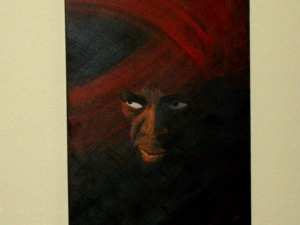
And one very new…”Why I Don’t Write”
Why I Don’t Write
I don’t write
because I am tired by
too many situations
happening at the same time
like trying to watch
all the clouds
at once
Do the countless institutional forms
count as poetry?
the repeated reverberations
of my essential information
asked over and over
like the echo of a past
I’ve been chained to
Do I have to know everything?
all the time?
as if I were a living tome
of bad memories and mistakes
Can I forget how to write my name?
forget how to spell emotions
in such a way that you’d understand?
Do I need to write my lust
on scraps of paper
when the message
can be plainly seen on my face?
read by anyone not blinded
by art, poetry, too many books
Can I be heard outside the song?
Sometimes I don’t write
because I hate the pen
hate the poetry
the way ones hates
a nagging, overbearing lover
the way the whore hates the pimp
the way paper hates fire
I don’t want to write anymore
because it’s futile
like wishing on stars
whistling at women
and spilling your heart
to the uncaring illiterate mass
of bleating sheeple
I don’t want to write this
blathering excuse for a poem
this redundant exercise in futility
this misanthropic screed
oozing forth like blood
spilled on a xenophobic landscape
during a relentless war
I want to break all the pens
burn all the books
silence the singers
blind the artists
tear the tongues from the poets’ mouths
If you didn’t know me
when I touched you
you never will
.
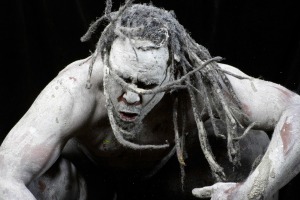
J: Thanks so much, David.
D: Thank you Judih, it was an honor to have you interview me.
Editor’s note: for updates on David’s appearances at Open Mics as well as his latest work, check out his blog.
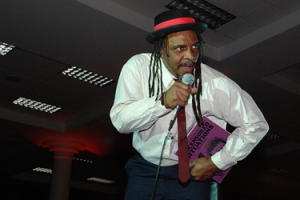
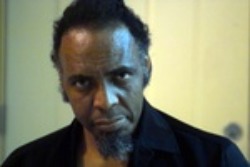
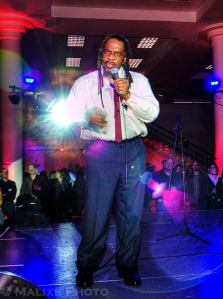
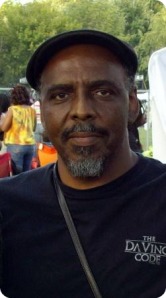
One thought on “David L. Jones Speaks Out!”